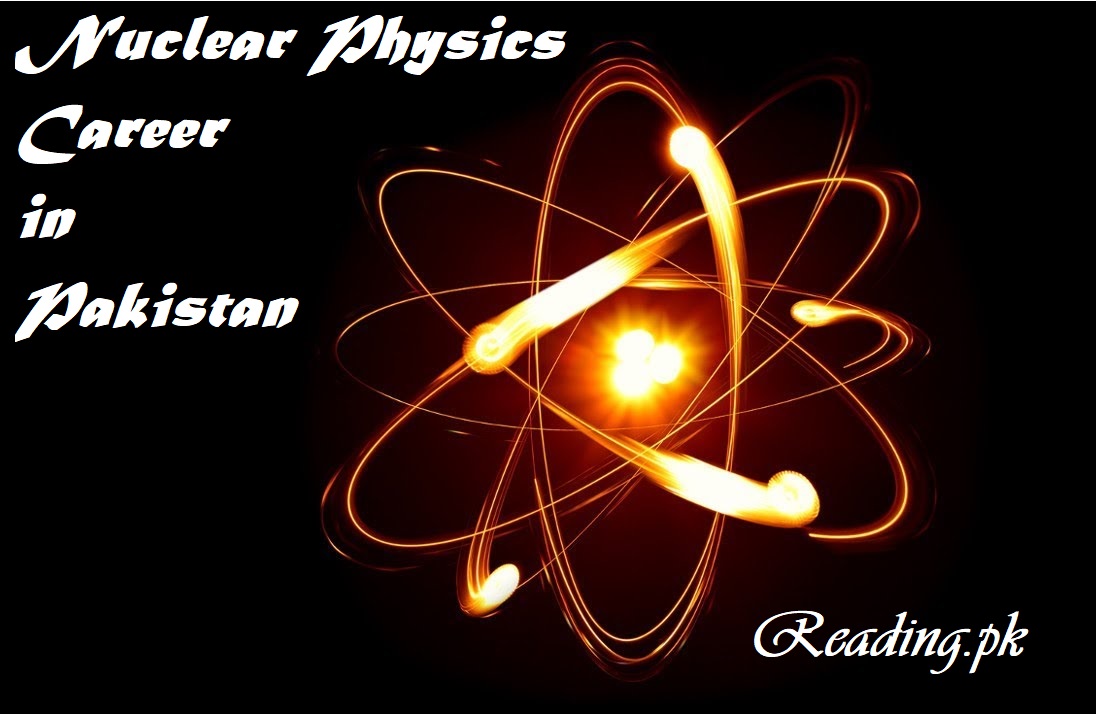Students attracted by Nuclear Physics can plan their future studies according to the needs of this field to have a lucrative career in Pakistan. This page will provide information on the Nuclear Physics career, scope and scope of the study, the courses, subject areas and skills required, job opportunities, and working nature. Nuclear Physics career is one of the most popular jobs in Pakistan because of its use in Atomic Energy Plants.
Nuclear Physics Nuclear Physics in the field of Science studies nuclear nuclei and their constituents and interactions. Other types of nuclear matter also are being studied. The study of nuclear physics must not be mistaken for atomic physics, which examines the atom as a whole and its electrons. Nuclear Physics Nuclear Physics is the study of the physical properties of quantum as well as relativistic on the level of the nucleus of the atom.
The Nuclear Physics expert is knowledgeable about the processes of nuclear reactions such as radioactive fission, particle accelerators, the detection of nuclear particles, and instruments. He will discuss the structure and behaviour of the atomic nucleus utilizing the quantum mechanics of particle simulation and models. He is fascinated by the phenomenon of nuclear energy that takes place in nuclear reactors and the inside of stars. He is well-versed in the workings of nuclear reactors and weapons.
[lwptoc]
The amount of Nuclear Physics in Pakistan in the area of Physics deals with the use of nuclear reactions at the atomic level. It is the study of the fission and fusion of nuclei on the atomic scale or the application of subatomic Physics, which is based on the fundamentals of Nuclear Physics. We live in the age in age of technology as well as Science. Therefore, staying up-to-date on the latest technology and developments is essential.
Pakistan is a nuclear nation working to make its citizens aware of Nuclear Physics. It is among the top and most promising fields in Pakistan. This is the most suitable field for those who want to serve their country in an authentic way. Nuclear Physics in Pakistan scope is also regarded as the highest level of the year.
Nuclear Physics Scope in Pakistan
Recognizing the utmost importance of nuclear physics, Pakistan, a country with nuclear power capabilities, actively fosters research and strives to enhance awareness in this dynamic field. The ever-growing demand for nuclear energy within the nation presents remarkable opportunities for nuclear engineers. By immersing yourself in the study of nuclear physics and pursuing a career in this captivating realm within Pakistan, you possess the potential to make substantial contributions to the country’s technological advancements and revolutionary innovations in the realm of nuclear energy.
Whether you delve into the intricate workings of nuclear power plant operations, engage in reactor design, ensure radiation safety, or partake in the realm of nuclear medicine, your profound expertise shall play an instrumental role in tackling the country’s energy requirements, safeguarding national security, and propelling the realm of healthcare forward.
Embracing this trans formative pathway holds the promise of a luminous future, granting you the opportunity to forge a profound and meaningful impact upon Pakistan’s flourishing nuclear industry while simultaneously contributing to the holistic progress and development of our beloved nation.
Nuclear Physics Career in Pakistan
It is said that a Nuclear Physics in Pakistan degree is a must for anyone who wants to work in Pakistan. A BS or MS Nuclear Physics Degree holder is likely to be employed in Pakistan’s most crucial private and public Nuclear Physics Jobs.
- Research Centers
- Medical Fields
- Atomic Bomb Plants
- Cancer Hospitals
- Atomic Energy Plants
- Nuclear Engineering Research Institutes
- Uranium Enrichment Plants
- Medical Technology Labs
- Radiation Departments of Hospitals
- College and Universities
- Pak Army
The jobs that are relevant to Nuclear Physics are;
- Radiologist
- Physicist
- Nuclear Scientist
- Medical Researcher
- Atomic Scientist
- Nuclear Engineer
- Atomic Engineer
- Scientific Atomic Writer
- Research Assistant
- Lecturer
Nuclear Physics Career in Pakistan Scope, Courses and Jobs 2024
nuclear physics degree
A BS Degree with a major in Nuclear Physics can be completed within four years. An MS in Nuclear Physics in two additional years and a PhD in two or three years to earn the MS degree. The accelerated BS MS program could be completed within 5 months instead of four years. BS followed by two 2years to earn getting the MS degree.
Nuclear Physics involves the research of neutrons and protons that are at the heart of an atom, as well as interactions that keep them together that are only a few femtometres (10-15 metres) across. Examples of nuclear reactions are fission, radioactive decay, the breaking up of a nucleus and the fusion process, which involves the fusion of nuclei.
Graduate from the Bachelor’s degree program. Bachelor’s program in Nuclear Physics and Technology engineering, chemistry, or applied physics with a focus on nuclear Science could enable students to pursue their studies in graduate programs and prepare for a future career as an expert in nuclear Science.
- Get a Bachelor’s Degree from a university in Nuclear Physics (4 years)
- Get a Master’s degree from a school of Nuclear Physics (2 years)
- Establish State Licensure (timeline varies)
- Learn from the field (1 to 4 years)
Nuclear Physics Subjects
You can follow the main topic, Nuclear Physics in Pakistan, as follows. It is a 4-year undergraduate program in which universities offer some of the nuclear Physics courses in Pakistan as elective or compulsory.
- Chemistry
- Mathematics
- English
- Nuclear Reactions and Radiations
- Introduction to Medical Imaging
- Nuclear Reactor Theory and Design
- Fusion Power Engineering
- Radioactive Waste Management
- Radiological and Biophysics
- Nuclear Materials
List of equations in nuclear and particle physics
Best Universities for Nuclear Physics in the World
Responsibilities of Nuclear Physics
Nuclear Physicists apply physical laws and theorems to examine how the particles within the nucleus of atoms can move and work spatially. They usually work in research and are located in fields like electronic, energy aerospace, communications, and healthcare equipment. A Nuclear Physicist performs tests, examines the latest discoveries, applies Science in innovative and novel ways, and creates new, safer, cleaner and more efficient ways to generate nuclear energy.
Nuclear Physicist also works in an experiment lab, studying characteristics of the nuclear material. Protons, neutrons, as well as electrons, are only the beginning. When you study, these and other elements contribute to the current knowledge database among scientists. Every time you make a discovery, you expand in the realm of possibilities that could be accomplished with the nuclear matter.
Another part of the job is finding ways to identify nuclear materials’ presence. This is a crucial job the nuclear physicist enhances the capacity of the public to detect bomb-making substances in their natural form. If we can have better ways to find the substance in train stations, airports or public spaces, as well as warehouses, we will have an advantage in the fight against terror. Nuclear physicists are typically found in government agencies, substantial research labs and nuclear reactors specifically designed to conduct research, and universities.
The development of nuclear physics being a science different from the atomic sciences began when radioactivity was discovered by Henri Becquerel in 1896 when he was studying phosphorescence in the uranium salts. The discovery of electrons from J. J. Thomson, in 1896 was proof that the atom’s structure was an internal structure.
Career in Nuclear Physics
Nuclear Technician
As a technician in the field of nuclear, you typically collaborate with other experts in various tasks. These can include assisting with radiation security measures, supporting research endeavors, operating nuclear testing equipment, and remotely controlling radioactive materials.
Working alongside professionals in the field, technicians play a crucial role in ensuring safety protocols are followed, conducting experiments, and managing specialized equipment. Their expertise and assistance contribute to the smooth functioning of nuclear operations and research, while also prioritizing safety and security in handling radioactive materials.
Nuclear Engineer
In nuclear engineering, you might be involved in developing, maintaining, operating, or designing nuclear power facilities. It is also possible to be involved in developing medical equipment that is used by experts in the area of nuclear medicine technology. The possibilities also include designing radiation detectors and coming up with ways to protect the environment and other things.
Medical Physicist
As a medical physicist, you will be responsible for the security and quality control of medical equipment using nuclear. You may also be responsible for developing new technologies to use for diagnosis. Medical physicists often assist doctors in determining the best radiation treatment.
nuclear physics salary
The salary range for nuclear physicists in the United States is quite broad, spanning from $22,088 to $589,331. The median salary for nuclear physicists is $106,018, meaning that half of the professionals in this field earn more than this amount and half earn less.
Within the middle 57% of nuclear physicists, salaries fall between $106,029 and $266,833. The top 86% of nuclear physicists earn salaries up to $589,331. These figures highlight the wide spectrum of earning potential within the field of nuclear physics.
FAqs
- Are Nuclear Physicist Jobs In Demand?
- is nuclear physics or chemistry
- is nuclear physics a good career
- Is nuclear physics difficult?
- What is the hardest branch of physics?

